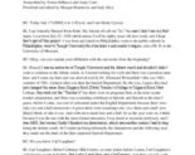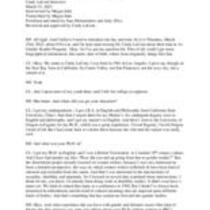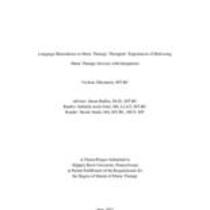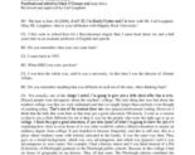- Title
- Language discourse in music therapy
- Abstract
-
The following thesis is a culmination of an interpretative phenomenological analysis research study seeking to understand music therapists’ experiences of delivering music therapy services with a language interpreter. The purpose of this study has four main tenets: 1...
Show moreThe following thesis is a culmination of an interpretative phenomenological analysis research study seeking to understand music therapists’ experiences of delivering music therapy services with a language interpreter. The purpose of this study has four main tenets: 1) To understand the therapists’ experiences of delivering music therapy services with interpreters, 2) To fill the gap in the music therapy literature on working with interpreters, 3) To serve as a resource for music therapists delivering music therapy services with interpreters, and 4) To combat the systemic issues of access and equity within the music therapy field. Data was collected through one-on-one semi-structured interviews with 5 music therapists. Data was then transcribed, coded, and thematized, resulting in 40 themes and seven domains: 1) Ways of working with interpreters, 2) Benefits of working with interpreters, 3) Drawbacks of working with interpreters, 4) Music therapists’ feelings when working with interpreters, 5) Potential reasons for not working with interpreters, 6) Dangers of not working with interpreters, and 7) Considerations for music therapists working with interpreters. The findings indicate areas of growth and the need for increased education for music therapists when working with interpreters. Music therapists are also challenged to confront their own privileged stances on the issues of language and linguistic privilege within the U.S., as related to working with patients with limited English proficiency and from historically marginalized communities within music therapy.
Show less - Year Issued
- 2023
- Author
- Obermeier, Victoria
- Sub-title
- Therapists' experiences of delivering music therapy services with interpreters




















